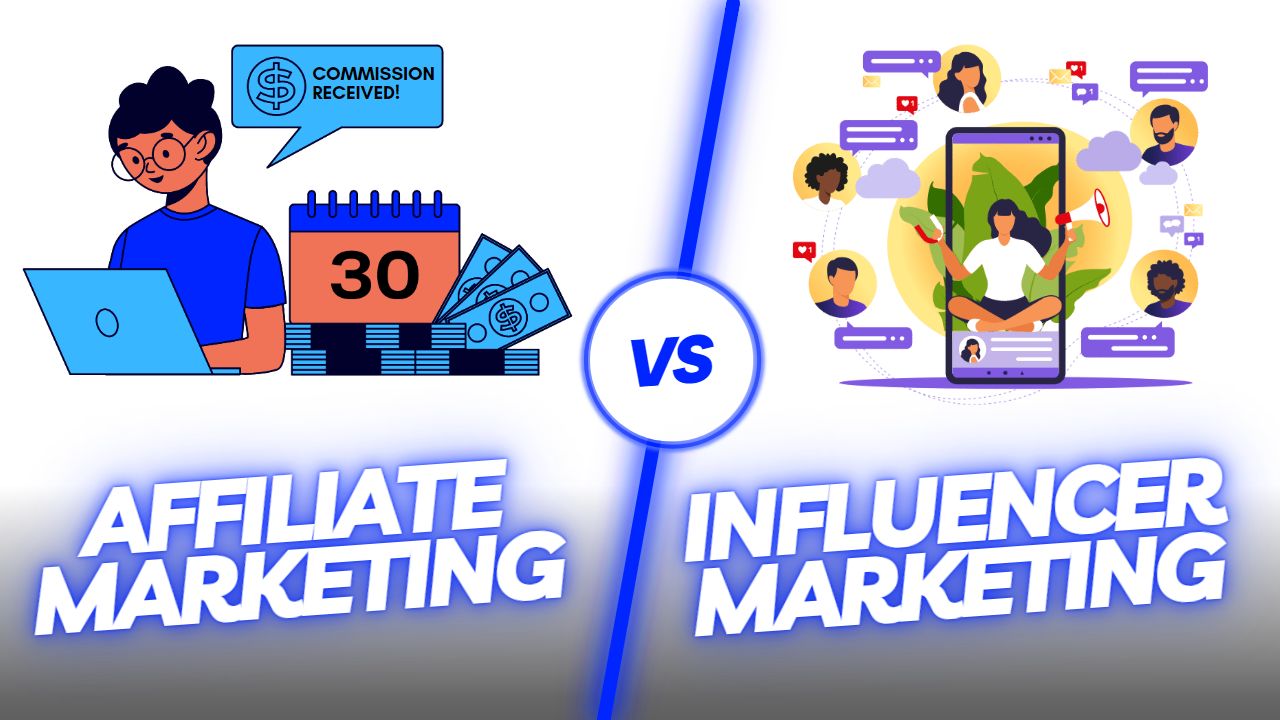In today’s digital landscape, businesses have various marketing strategies. Two popular methods that have gained significant attention in recent years are affiliate marketing and influencer marketing. Both approaches offer unique opportunities to promote products or services and drive conversions. However, deciding which strategy to choose can be a challenge.
This article will delve into the intricacies of affiliate and influencer marketing, comparing their advantages and disadvantages. By the end, you’ll be equipped with the knowledge to make an informed decision about the right marketing strategy for your business.
My Best Recommended & Proven Way to Make $100-$500 Per Day – Watch THIS FREE Video to START >>

Understanding Affiliate Marketing
- Definition and concept
- How it works
- Advantages and disadvantages
Understanding Influencer Marketing
- Definition and concept
- How it works
- Advantages and disadvantages
Affiliate Marketing vs Influencer Marketing: A Comparison
- Cost-effectiveness
- Reach and audience targeting
- Credibility and trust
- Control and flexibility
- Long-term impact
Choosing the Right Strategy for Your Business
- Goals and objectives
- Budget considerations
- Target audience analysis
- Brand alignment
- Measurement and tracking
Conclusion
FAQs
Understanding Affiliate Marketing
Affiliate marketing is a performance-based marketing strategy where businesses collaborate with affiliates (publishers, bloggers, influencers, or website owners) to promote their products or services. Affiliates earn a commission for each successful referral or sale they generate. This approach allows businesses to expand their reach and tap into the existing audiences of their affiliates.
How it works
In affiliate marketing, businesses typically provide their affiliates with unique affiliate links or promo codes. When an affiliate drives a potential customer to the business’s website through these links and the customer completes a desired action (such as making a purchase), the affiliate earns a commission. This model incentivizes affiliates to promote the products or services to maximize their earnings actively.
Advantages and disadvantages
One significant advantage of affiliate marketing is its cost-effectiveness. Businesses only pay commissions when desired actions occur, ensuring a positive return on investment. Additionally, affiliate marketing enables businesses to tap into niche markets and reach specific audiences through their affiliates’ established networks.
However, one drawback of affiliate marketing is the need for more control over the affiliates’ promotional methods. While most affiliates adhere to ethical practices, some may employ spammy or unethical tactics that can harm a business’s reputation. Additionally, the success of an affiliate marketing campaign relies heavily on the performance and influence of the affiliates themselves.
Understanding Influencer Marketing
Influencer marketing involves collaborating with influential individuals on social media platforms with a dedicated following and influence over their audience’s purchasing decisions. Influencers create content featuring the promoted products or services and share it with their followers. The goal is to leverage the influencers’ credibility and reach to drive brand awareness and conversions.
How it works
In influencer marketing, businesses identify relevant influencers in their industry or niche and establish partnerships with them. The influencers then create engaging content, such as sponsored posts, product reviews, or endorsements, to showcase the brand’s offerings to their audience. This content often integrates seamlessly into the influencers’ existing content, maintaining authenticity.
Advantages and disadvantages
One significant advantage of influencer marketing is the credibility and trust associated with influencers. Their loyal followers perceive them as trusted authorities, making their recommendations more influential. Moreover, influencer marketing allows businesses to tap into new markets and reach a wider audience, especially among younger demographics more receptive to influencer recommendations.
However, one potential disadvantage of influencer marketing is the cost. Influencers with larger followings often charge higher collaboration fees, making it a more expensive marketing strategy than affiliate marketing. Additionally, businesses may face challenges in finding the right influencers whose values align with their brand, ensuring an authentic partnership.
My Best Recommended & Proven Way to Make $100-$500 Per Day – Watch THIS FREE Video to START >>
Affiliate Marketing vs Influencer Marketing: A Comparison
It’s essential to compare affiliate and influencer marketing based on various factors to decide which strategy to choose.
Cost-effectiveness
Affiliate marketing is renowned for its cost-effectiveness. Since businesses only pay commissions when desired actions occur, they have better control over their marketing budget. On the other hand, influencer marketing can be more expensive, requiring upfront payments to collaborate with influencers.
Reach and audience targeting.
In terms of reach, influencer marketing has an edge. Influencers have dedicated followers who trust their recommendations, allowing businesses to tap into their established audience. In contrast, affiliate marketing provides access to a broader network of affiliates, each with its audience, allowing for niche targeting.
Credibility and trust
Influencer marketing excels in leveraging the credibility and trust associated with influencers. Their authentic content and personal connection with their audience make their recommendations highly influential. With affiliate marketing, while affiliates can promote products or services effectively, credibility and trust may vary depending on the affiliate’s reputation.
Control and flexibility
Affiliate marketing offers more control and flexibility in terms of promotional methods. Businesses can provide guidelines and monitor the affiliates’ activities, ensuring compliance with brand values. In contrast, influencer marketing requires a certain level of trust in the influencers’ creativity and approach to content creation.
Long-term impact
Influencer marketing often generates immediate brand awareness and engagement, especially with sponsored posts. However, its impact may diminish as new content takes place. In contrast, affiliate marketing can provide long-term benefits through ongoing relationships with affiliates as they promote products or services over an extended period.
Choosing the Right Strategy for Your Business
When selecting between affiliate marketing and influencer marketing, consider the following factors:
Goals and objectives
Identify your specific marketing goals and objectives. Influencer marketing may be the right choice to drive immediate brand awareness and engagement. On the other hand, if your goal is to generate consistent sales and conversions over time, affiliate marketing can be a more suitable strategy.
Budget considerations
Evaluate your marketing budget and allocate resources accordingly. Affiliate marketing provides better control over expenses if you have a limited budget and seek a cost-effective approach. If you have the financial capacity to invest in influencer collaborations and prioritize brand visibility, influencer marketing can be a viable option.
Target audience analysis
Understand your target audience and their preferences. Influencer marketing can be highly effective if they are more receptive to influencer recommendations and actively engage with influencer content. Affiliate marketing may yield better results if your audience is more inclined to make purchase decisions based on reviews and comparisons.
Brand alignment
Consider the values and image of your brand. Ensure the chosen marketing strategy aligns with your brand’s identity and resonates with your target audience. Influencer marketing allows for direct association with influential personalities, while affiliate marketing provides a broader reach without direct brand association.
Measurement and tracking
Determine the metrics you will use to measure the success of your marketing campaigns. Affiliate marketing offers precise tracking capabilities, as each referral or sale can be attributed to a specific affiliate. Influencer marketing metrics may include reach, engagement, and sentiment analysis.
Conclusion
There is no definitive winner in the affiliate marketing vs. influencer marketing battle. Both strategies have their strengths and weaknesses, and the optimal choice depends on your business’s goals, budget, target audience, and brand identity. Consider each approach’s unique advantages and evaluate them in the context of your specific marketing objectives. By carefully analyzing these factors, you can determine whether affiliate or influencer marketing will yield the best results for your business.
My Best Recommended & Proven Way to Make $100-$500 Per Day – Watch THIS FREE Video to START >>
Frequently Asked Questions (FAQs)
Is affiliate marketing or influencer marketing more cost-effective?
Affiliate marketing is generally more cost-effective as businesses only pay commissions for desired actions. Influencer marketing involves upfront payments to collaborate with influencers.
Which strategy provides better reach and audience targeting?
Influencer marketing provides better reach by leveraging the established audience of influencers. Affiliate marketing offers access to a broader network of affiliates for niche targeting.
Are influencers more credible than affiliates?
Influencers often have higher credibility and trust due to their personal connection with their audience. Affiliates’ credibility varies based on their reputation and promotional methods.
Can I have long-term partnerships with influencers or affiliates?
Influencer marketing generates immediate impact, while affiliate marketing allows for long-term relationships with affiliates who continue promoting products or services.
How do I choose the right strategy for my business?
Consider your goals, budget, target audience, brand alignment, and measurement metrics to choose between affiliate marketing and influencer marketing.
Thank you for reading my article “Affiliate Marketing vs Influencer Marketing: Which Strategy Should You Choose?” I hope it helps! Please share this on your social media if you benefit.







